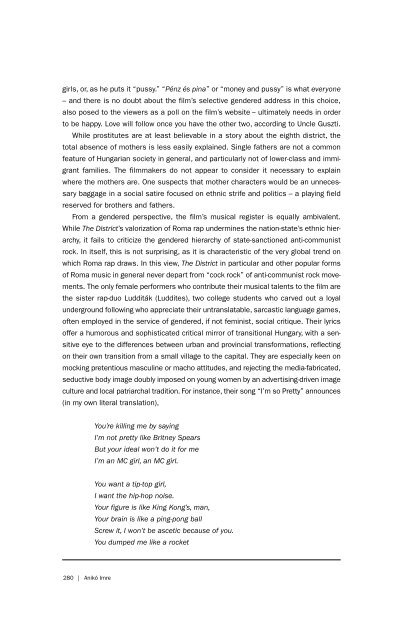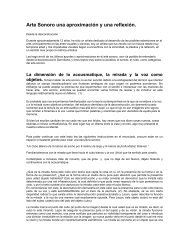The Body Artist - Alejandrocasales.com
The Body Artist - Alejandrocasales.com
The Body Artist - Alejandrocasales.com
Create successful ePaper yourself
Turn your PDF publications into a flip-book with our unique Google optimized e-Paper software.
girls, or, as he puts it “pussy.” “Pénz és pina” or “money and pussy” is what everyone<br />
– and there is no doubt about the film’s selective gendered address in this choice,<br />
also posed to the viewers as a poll on the film’s website – ultimately needs in order<br />
to be happy. Love will follow once you have the other two, according to Uncle Guszti.<br />
While prostitutes are at least believable in a story about the eighth district, the<br />
total absence of mothers is less easily explained. Single fathers are not a <strong>com</strong>mon<br />
feature of Hungarian society in general, and particularly not of lower-class and immigrant<br />
families. <strong>The</strong> filmmakers do not appear to consider it necessary to explain<br />
where the mothers are. One suspects that mother characters would be an unnecessary<br />
baggage in a social satire focused on ethnic strife and politics – a playing field<br />
reserved for brothers and fathers.<br />
From a gendered perspective, the film’s musical register is equally ambivalent.<br />
While <strong>The</strong> District’s valorization of Roma rap undermines the nation-state’s ethnic hierarchy,<br />
it fails to criticize the gendered hierarchy of state-sanctioned anti-<strong>com</strong>munist<br />
rock. In itself, this is not surprising, as it is characteristic of the very global trend on<br />
which Roma rap draws. In this view, <strong>The</strong> District in particular and other popular forms<br />
of Roma music in general never depart from “cock rock” of anti-<strong>com</strong>munist rock movements.<br />
<strong>The</strong> only female performers who contribute their musical talents to the film are<br />
the sister rap-duo Ludditák (Luddites), two college students who carved out a loyal<br />
underground following who appreciate their untranslatable, sarcastic language games,<br />
often employed in the service of gendered, if not feminist, social critique. <strong>The</strong>ir lyrics<br />
offer a humorous and sophisticated critical mirror of transitional Hungary, with a sensitive<br />
eye to the differences between urban and provincial transformations, reflecting<br />
on their own transition from a small village to the capital. <strong>The</strong>y are especially keen on<br />
mocking pretentious masculine or macho attitudes, and rejecting the media-fabricated,<br />
seductive body image doubly imposed on young women by an advertising-driven image<br />
culture and local patriarchal tradition. For instance, their song “I’m so Pretty” announces<br />
(in my own literal translation),<br />
280 | Anikó Imre<br />
You’re killing me by saying<br />
I’m not pretty like Britney Spears<br />
But your ideal won’t do it for me<br />
I’m an MC girl, an MC girl.<br />
You want a tip-top girl,<br />
I want the hip-hop noise.<br />
Your figure is like King Kong’s, man,<br />
Your brain is like a ping-pong ball<br />
Screw it, I won’t be ascetic because of you.<br />
You dumped me like a rocket







